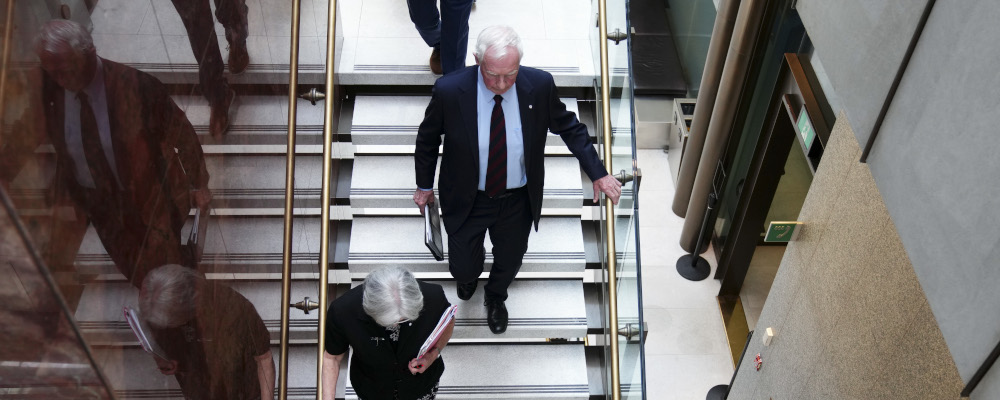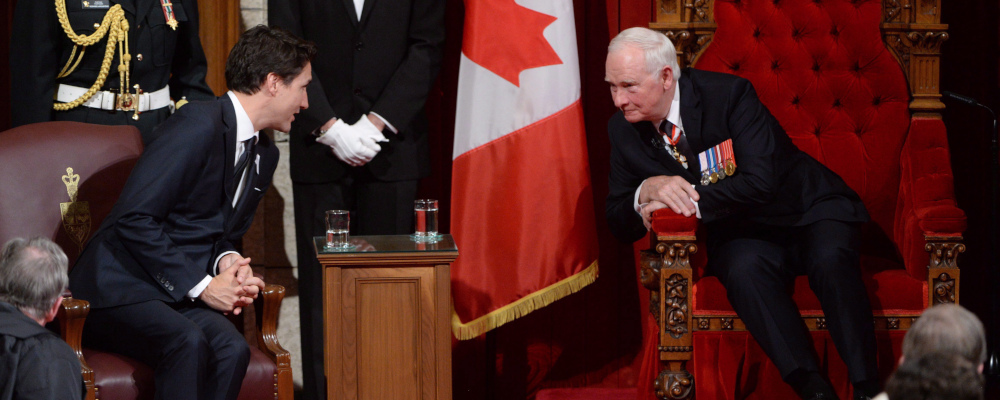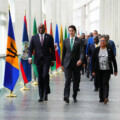Former governor general and independent special rapporteur David Johnston released his report on foreign election interference this week, recommending against a public inquiry into the issue. Johnston also dug into how intelligence reports find their way through the bureaucracy and why some important documents were missed by key people in the government. The Hub’s editor-at-large Sean Speer spoke with Ian Brodie, the former chief of staff to Stephen Harper, for some insight into how governments handle classified and top secret information.
SEAN SPEER: One of David Johnston’s key findings is the following: “Staff at the PMO speak of being given a large binder in a secure room with an agency client relations officer present, a short time to review it, with no context or prioritization of the material, and no ability to take notes (for security reasons). The binder may have a significant mix of topics from around the world, and no one says, ‘you should pay attention to this issue in particular.’ If staffers are away, they may not see the binder that day.” This sounds pretty sub-optimal. Is that consistent with your experience?
IAN BRODIE: I don’t understand this part of the report. When Mr. Trudeau’s chief of staff testified at committee recently, she spoke of a system in which she was briefed regularly and nothing was withheld from the prime minister. Of course, anything that is reported to PMO is assumed to be important, otherwise it wouldn’t be sent over. Whenever I had questions about a report I received, I found the agencies were quick to get back with clarification or further background. The Privy Council Office has its own in-house intelligence analysis group, the International Assessments Secretariat, and I eventually got to know many of the analysts who worked there.
SEAN SPEER: One of the more shocking findings is that intelligence concerning the PRC’s targeting of MP Michael Chong was sent to the Public Safety Minister and his chief of staff via a Top-Secret Email Network but they did not read it because they did not have access to the network. Does that make sense to you? How did you tend to access and review intelligence materials?
IAN BRODIE: I have no idea how Mr. Mendicino’s office works, but this part of the Johnston report doesn’t compute with me. I received intelligence reporting on paper and with in-person briefings because I did not have a Top-Secret facility in my office. Intelligence analysts were always on hand to provide background as to why a report was in my folder that day. I assume Mr. Mendicino meets regularly with his deputy minister — ministers are expected to make time to meet with their department officials regularly — and I am sure his deputy would have been able to hand-deliver intelligence reporting at one of these meetings. Again, given that this intelligence report dealt with a foreign government’s effort to punish a MP’s family for a vote taken in the House of Commons, I cannot imagine any official, let alone a deputy minister, deciding not to send that report to the minister. And if the minister refused to take it, to have PCO intervene to make sure the reporting was shared with political people — ministers and senior political staff.
SEAN SPEER: How much are these issues concerning the distribution and use of intelligence within the government a function of legal and policy factors versus the actions and preferences of the political arm of the government? That is to say, how much influence does PMO and the Cabinet have on the culture and processes of intelligence sharing and briefings?
IAN BRODIE: I only know how these matters were handled when I was chief of staff. I thought the reporting was important, I made it clear I would make time to be briefed, and I often asked follow up questions that required follow up reporting. I visited several intelligence agencies in person while I was chief of staff. Mr. Harper read a great deal of intelligence reporting and acknowledged he had read it in writing.
If the PM and his ministers found their national security briefings were not helpful to them, my goodness, they had six years to order changes before the Chong report was issued.
SEAN SPEER: What did you take away from the report? Was there anything that surprised you?
IAN BRODIE: Johnston is correct: relying on seriatim media reports of bits and pieces of intelligence reporting can give the reader an incomplete picture of what was known and when it was known. Simply saying “trust us, it’s fine” is even less helpful. What would help everyone understand what was going on? A full, public inquiry that prepares a full report to everyone.
We sometimes forget — this is how CSIS came to be in the first place. There was a full, frank and public inquiry into covert operations of the RCMP security service. The inquiry revealed many covert details about the security service’s operations and tactics. The inquiry thought Canadians could be trusted will the whole truth, and the government of the day created CSIS in response.
Recommended for You

Ginny Roth: J.D. Vance, Pierre Poilievre, and how they slice their economic pie

David Polansky: As President Biden leaves the race, will the Democratic Party hodgepodge hold?

Peter Menzies: The mainstream media should love Doug Ford, now that he’s subsidizing them

Geoff Russ: A future Conservative government must fight the culture war, not stand idly by










